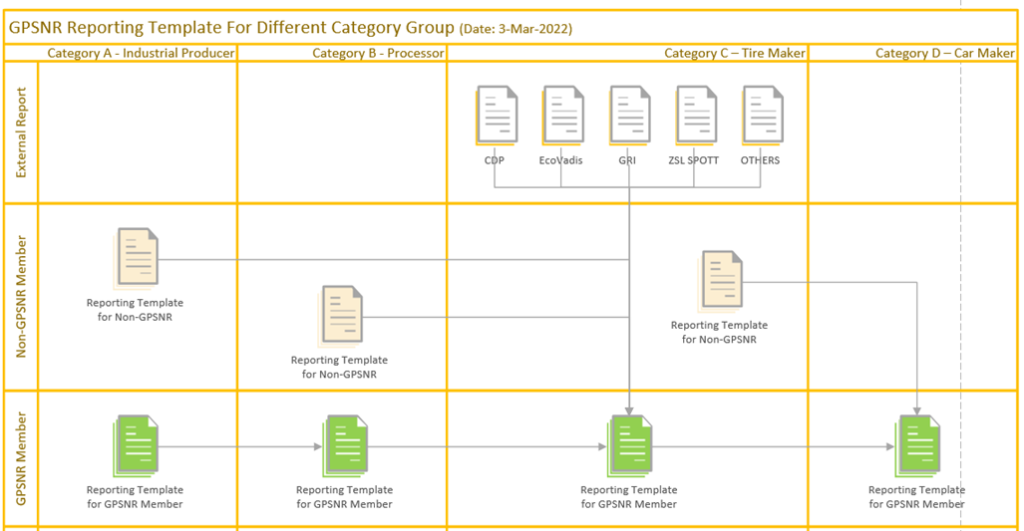Webpage design consultancy
Background
At GPSNR, we bring together companies, smallholders, academia and civil society to transform the natural rubber supply chain into a sustainable, equitable and fair one.
Even though it was launched just in 2018, 50% of the world’s natural rubber demand already finds membership in GPSNR. This is only a small reflection of the amount of work that has taken place over the last three years.
Scope
To document important decisions and milestones and ensure institutional memory is well-recorded, GPSNR is seeking a User Interface/User experience consultant to design three web pages that record a timeline, GPSNR’s assurance roadmap and the structure and overview of its working groups.
Core tasks
Working closely with the GPSNR secretariat, the consultant will:
- Create and finalize three web-page mockups (wireframes, prototypes, and corresponding user interface components like templates, stylesheets, scripts, images, etc).
- Include four rounds of feedback for each mockup from the GPSNR secretariat and key stakeholders
- Integrate components in the CMS to allow review and testing, and make corresponding adjustments based on feedback received.
- Liaise with GPSNR’s CRM expert to ensure that the mockups are feasible for the GPSNR website
- Work closely with GPSNR’s Communications Manager on translating content into user oriented design
Terms
- The engagement will take place for a period of six weeks from 15 October to 26nd November 2021. Interim dates for wireframes and approvals will be mutually agreed upon after confirmation.
Necessary Competencies:
- Solid understanding of the concepts of user experience, user interface design principles and conceptual design.
- Expert knowledge in WordPress CMS and Elementor
- Knowledge of Bootstrap, jQuery and AngularJS, HTML, and Elementor Shortcodes
- Knowledge of industry-standard design tools such as Adobe Photoshop, Illustrator and Dreamweaver.
- Knowledge of WordPress Content Management System, particularly with respect to page template design, will be considered an asset.
- Eye for design and attention to detail are essential.
Submission Guidelines:
The following submission guidelines & requirements apply to this Request for Proposal:
- Proposals will only be accepted from individuals or firms with experience relevant to this project.
- Submissions must include
1) a portfolio of previous work
2) a paragraph describing how the consultant would approach such a project
3) a financial proposal with a breakdown of how much each competent of the work would cost. - Proposals must be signed by a representative that is authorized to commit to the bidder’s company.
- Proposals must be received by 4 October 2021 to be considered. Proposals should be submitted to bani.bains@gpsnr.org and stefano.savi@gpsnr.org for consideration.
- To receive a copy of the draft content, applicants can email bani.bains@gpsnr.org
RFP and Project Timelines
| Submission of Proposal | 4/10/2021 |
| Selection of top bidders and further conversations | 7/10/2021 |
| Contract award/notification to unsuccessful bidders | 11/10/2021 |
| Work commences no later than | 15/10/2021 |
Budget
The Platform is anticipating that a total budget of no more than 6,000 Singapore Dollars (SGD) be allocated to this engagement.
Payment terms shall be:
20% at the signing of the contract
30% at the midpoint date to be agreed upon and memorialized in the contract based on the submitted work plan
50% on delivery of the final report
Evaluation Factors
GPSNR will rate proposals based on the following factors:
- Responsiveness to the requirements set forth in this Request for Proposals
- Relevant past performance / experience and / or any samples of past work
- Cost, including an assessment of total cost of ownership.
- Technical expertise/experience of bidder and the bidder’s staff
GPSNR reserves the right to award to the bidder that presents the best value to GPSNR as determined solely by GPSNR in its absolute discretion.



